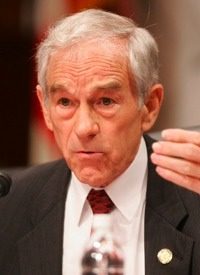
The Federal Reserve Transparency Act (H.R. 1207), Congressman Ron Paul’s landmark bill to audit the Federal Reserve, has been gutted in a House subcommittee as it works its way toward a vote in the full House. The bill, which has garnered an astonishing 308 cosponsors from both parties, has attracted the scalpel of North Carolina Democrat Mel Watt (whose district happens to include Charlotte, the home of Bank of America, America’s largest commercial bank). According to Congressman Paul, whose Campaign for Liberty posted a video on the bill last weekend, Watt has cut out “just about everything” in prepping the bill for a full committee vote.
The bill in its original form required audits of Fed transactions with foreign banks, of its deliberations on monetary policy, of the activities of the Open Market Committee, and disclosure of communications between the Federal Reserve Board and reserve banks. All of these provisions, according to Congressman Paul, have been removed. “There’s nothing left,” Paul told Bloomberg News in a telephone interview. “This is not a partisan issue. People all over the country want to know what the Fed is up to, and this legislation was supposed to help them do that.”
Congressman Paul intends to try to reinstate the bill’s original language and provisions in full committee deliberations, and is hopeful that many of the bill’s hundreds of co-sponsors will exert appropriate pressure on the committee to bring the bill in its pristinity to a full House vote sooner rather than later.
One of the bill’s most powerful sponsors, Congressman Barney Frank (chair of the House Financial Services Committee), intends that the bill in its final form require a lapse of time between Fed actions and their disclosure to auditors and Congressional overseers. Frank believes that a delay would “lessen market impact” while ensuring Fed accountability in the longer run. Congressman Paul, however, is opposed to any such dilution of the bill’s language, believing that any mandated delays in holding the Fed accountable would allow the central bank too much room to evade responsibility.
Congressman Paul is still optimistic that the bill will pass in some form, given the magnitude of support it has received. He noted that the Federal Reserve and the interests that defend its so-called “independence” (read: “secrecy”) are very entrenched and unlikely to yield without a fight.
The current struggle underway to subject the Federal Reserve to congressional scrutiny may turn out to be as historically significant as President Andrew Jackson’s titanic contest of wills with the arrogant, crafty head of the Second Bank of the United States, Nicholas Biddle. The latter, in trying to stave off the dissolution of his beloved seat of power, used the resources of the bank to create a recession and marshaled all his allies in Congress and business against Old Hickory, but ultimately lost the battle. Whether Congressman Paul and his allies can carry the day against Fed Chairman Bernanke and his host of establishment supporters remains to be seen.
Photo of Ron Paul: AP Images



